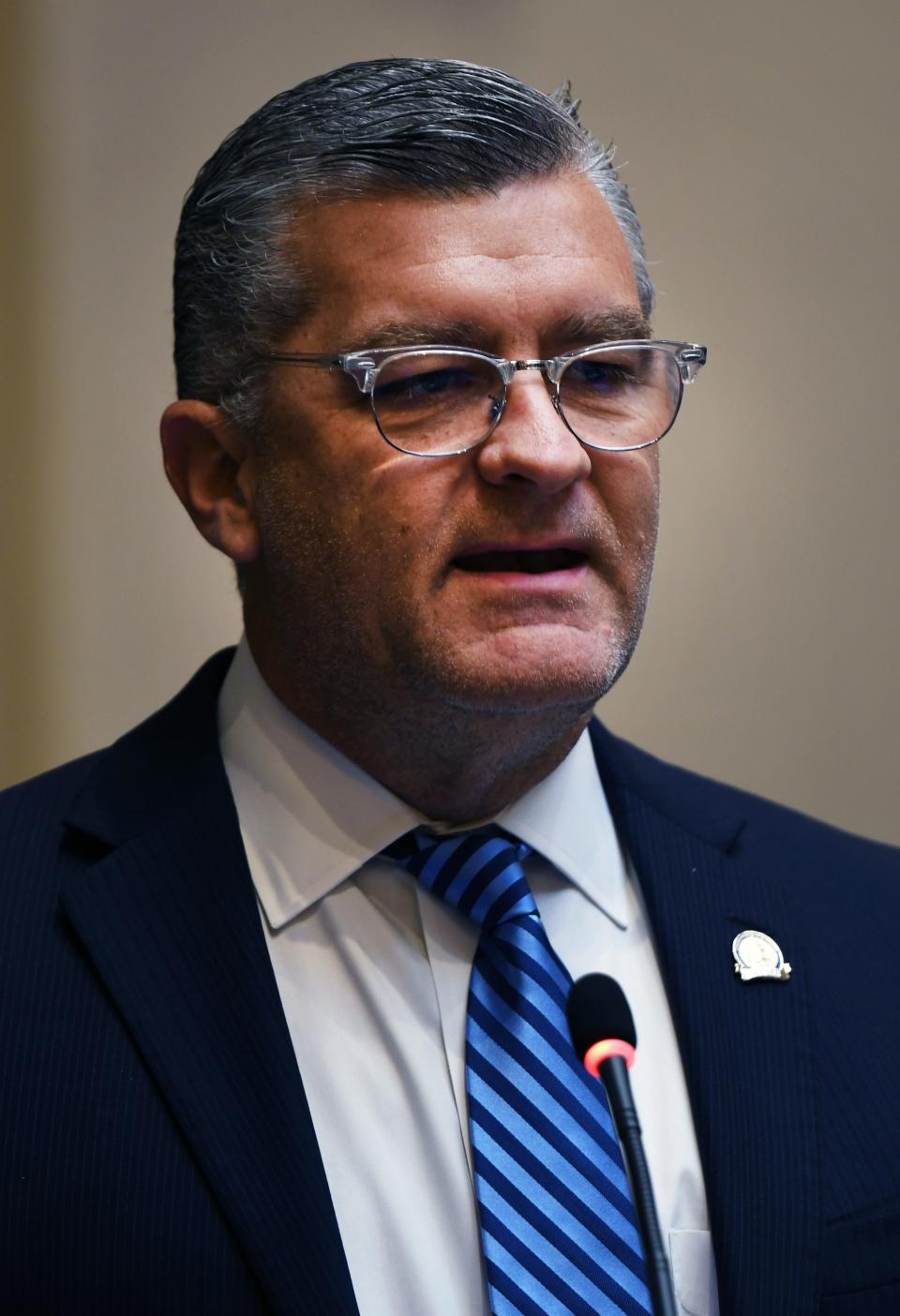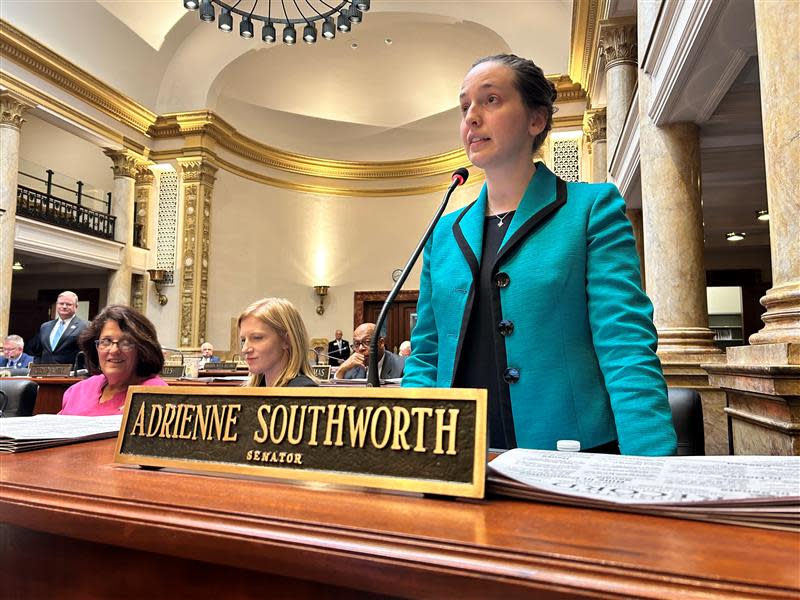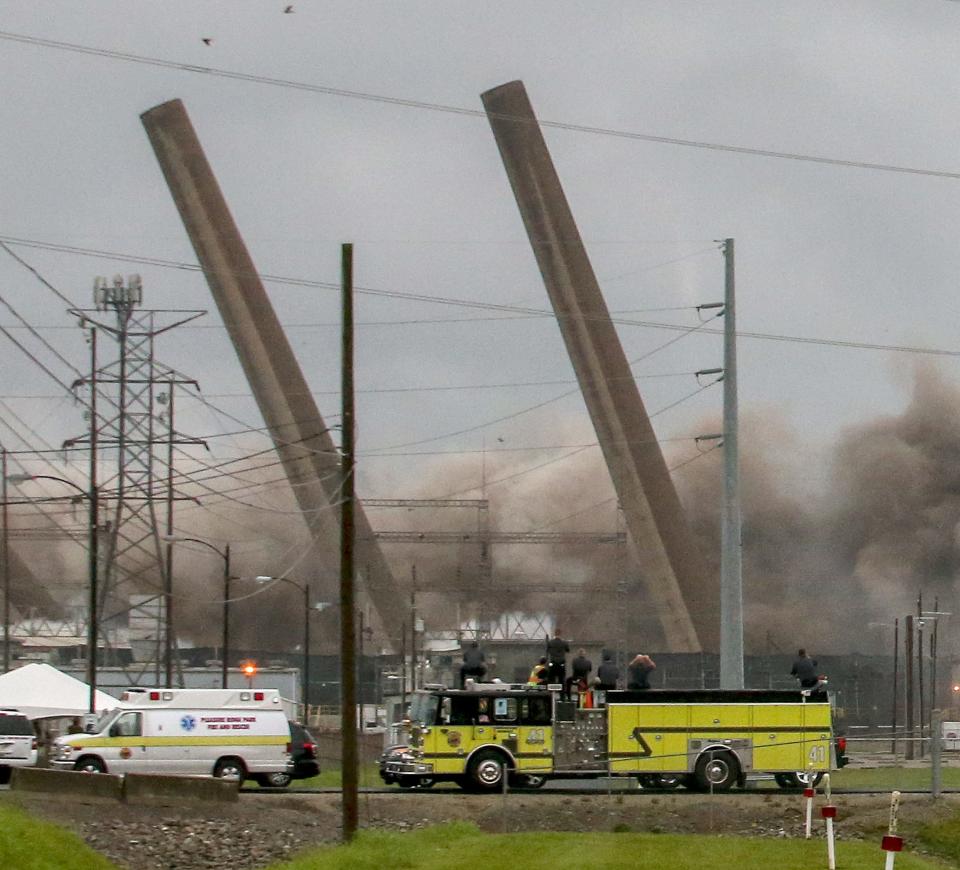'Another layer of bureaucracy'? Lawmakers aim to give coal, gas more say on energy policy
A Republican-led bill establishing a new commission to study and advise on Kentucky’s long-term energy needs passed easily in the state Senate this week, despite criticisms of a designed bias on the commission in favor of fossil fuel industry lobbyists.
Senate Bill 349 would create the Energy Planning and Inventory Commission, or EPIC. It would analyze Kentucky’s future energy needs through an economic development lens, according to sponsors, and review utilities’ applications to retire generating units.
The state’s existing Public Service Commission, which decides utility cases, would be required by law to take the commission’s findings into consideration for proposed generating unit retirements.
The bill’s group of Republican sponsors is led by Sen. Robby Mills, R-Henderson, who similarly carried legislation last session to make fossil fuel-fired power plant retirements more difficult. He also joined Daniel Cameron's gubernatorial ticket last year in opposition to what he called the "radical environmentalist" policies of the Biden and Beshear administrations.
Mills repeated his criticisms of federal energy policy on the Senate floor Tuesday, accusing the Biden administration of “regulating into near-extinction” Kentucky’s “plentiful baseload energy,” and was joined by fellow Republicans in lamenting the continued decline of the state’s coal industry — a trend also seen during the Trump administration, The Courier Journal previously reported.
“Further retirement of fossil fuel-fired electric generating resources is not necessary for the protection of the environment or the health, safety, and welfare of the citizens of the Commonwealth,” according to Mills’ bill.
This statement is in direct conflict with the scientific consensus of physicists, climatologists and other experts globally, whose research has determined a prompt and substantial reduction in fossil fuel use is non-negotiable for preserving a habitable planet.
With the Senate's passage of the bill, it now heads to the House. Here's what to know about the legislation and how it could shape Kentucky's future decisions on energy policy:
What does Senate Bill 349 do?

The bill’s key function is establishing EPIC, attached to the University of Kentucky Center for Applied Energy Research with an 18-member board and five-member executive committee.
Mills said the commission would study the state’s current and future energy needs with economic development and grid reliability in mind, particularly as the state looks to attract major industries with high energy demands.
Of the 18 board members, at least five would be nominated by the fossil fuel industry, including groups representing coal, oil and gas interests. Only one member of the commission would represent renewable energy interests, and two would come from the nuclear energy and nuclear fuel industries.
Other members would represent utility, economic and banking interests and consumers, as well as the state’s Energy and Environment Cabinet and Cabinet for Economic Development.
A later version of the bill also removed a requirement that commission members be residents of Kentucky.
Audrey Ernstberger, a Kentucky Resources Council attorney, said in an email the change risks “voluntarily ceding Kentucky’s major energy decisions to outsiders,” calling it “outrageous.”
In addition to establishing a new energy planning commission, the Republican proposal would also define what sources of energy are “dispatchable” — meaning output can be scaled up and down on demand — and what sources are “intermittent.”
The bill Mills carried last session requires the Public Service Commission to ensure replacements for retiring generating units are dispatchable. Under his bill this session, solar, wind, geothermal and hydropower are all defined as intermittent, or non-dispatchable.
“The definition for ‘intermittent’ assumes that certain energy sources (including pumped hydro, geothermal, biomass and anaerobic digestion) cannot provide consistent and dispatchable power. That is not the case,” according to a letter on the bill co-signed by the heads of the Public Service Commission and the Energy and Environment Cabinet.
What did senators say about the bill?
Tuesday’s Senate vote on the bill largely fell along party lines — 28-9 with one pass vote — but several Republicans joined Democrats in opposition.
Sen. Adrienne Southworth, R-Lawrenceburg, was the sole pass on the vote, agreeing with the premise of studying the state’s big-picture, long-term energy needs but balking at the proposed makeup of the commission.
“This bill creates a board of, essentially, lobbyists,” Southworth said on the Senate floor. “As legislators … we recognize all the names of these folks that assuredly would be appointed to this board.”

Nominations to the commission would be made by groups including the Kentucky Coal Association, the Kentucky Oil and Gas Association and the Kentucky Banker’s Association.
“It concerns me greatly that we have, essentially, lobbyists now being appointed to a board to help make decisions in the public interest on the public side, not on the private side,” Southworth said.
“This bill is not, as some people have tried to portray it, a coal bill,” said Senate President Robert Stivers, R-Manchester and a co-sponsor on the bill, citing references to an array of energy sources throughout the legislation.
Stivers and other lawmakers also pointed to recent winter storms in arguing for more comprehensive grid planning. Last year, an LG&E and KU representative testified to the Public Service Commission, reporting coal-fired power, in addition to natural gas, failed amid Winter Storm Elliott, contributing to rolling blackouts.
Nearly absent from the Senate’s debate on Kentucky’s long-term energy policy was the looming threat of climate change. Sen. Karen Berg, D-Louisville, voted 'no' on the bill before referencing the risks of continued fossil fuel reliance.
“My constituents want clean energy, clean air and clean water,” she said. “And if we don't begin to deliver that to our children, then we're going to leave them in a world that is not safe to live in.”
In committee, Stivers said the proposed commission’s study of the grid would include the “context of, whether you believe in it or not, decarbonization, or global warming … that's part of the discussion.”
What did stakeholders say about the bill?
In their letter to legislators on Mills’ bill, the Public Service Commission and Energy and Environment Cabinet laid out a lengthy list of concerns about the bill, including a lack of appropriated funding, despite an estimated $1.5 million annual cost for the proposed analysis of energy needs.
In addition to various warnings about how EPIC could further burden the Public Service Commission’s existing process, the letter also brought up concerns over the bill’s originally imposed six-month time limit for the PSC to issue final orders on some utility applications, including retirements.
An amendment extended the time limit to eight months. If the commission does not issue its decision in that time, those applications would be automatically approved.
The PSC’s final order last year on LG&E and KU’s proposed coal plant retirements and new natural gas and renewable generation came in November, 10 months after the utilities’ joint application was filed.

When the bill was before the Senate Natural Resources and Energy Committee, Tami Wilson spoke on behalf of the Northern Kentucky Chamber of Commerce in opposition to the bill, saying it would not “foster a business-friendly climate.”
“While we empathize with Eastern Kentucky and the loss of jobs associated with the coal industry,” Wilson said, “we feel strongly that forcing our members and potential members to pay more for their energy simply to ensure we continue to support the coal industry is not a reasonable ask of the Northern Kentucky region.”
Sen. Chris McDaniel and Sen. Shelley Funke Frommeyer, both Northern Kentucky Republicans, voted against the bill in the floor vote.
Representatives of LG&E and KU and Duke Energy also spoke against the bill in committee.
“It’s just another layer of bureaucracy that I fear we're talking about here,” said John Crockett, president of LG&E and KU, citing an arduous process of generating unit retirements last year, and calling the proposed commission "a collection of special interests ... that would seek to promote their own agendas as part of this process."
Amy Spiller, representing Duke Energy, said the utility’s ability to meet Kentucky's energy needs “will be compromised by Senate Bill 349.”
She agreed with legislators that a more comprehensive approach to energy planning is warranted, but not through what she called "needless review" by a commission “artificially weighted toward one preference.”
Connor Giffin is an environmental reporter for The Courier Journal and a corps member with Report for America, a national service program that places journalists in local newsrooms to report on under-covered issues. The program funds up to half of corps members’ salaries, but requires a portion also be raised through local community fundraising. To support local environmental reporting in Kentucky, tax-deductible donations can be made at courier-journal.com/RFA.
Learn more about RFA at reportforamerica.org. Reach Connor directly at [email protected] or on X @byconnorgiffin.
This article originally appeared on Louisville Courier Journal: Coal, gas, oil interests could get more say on Kentucky energy policy